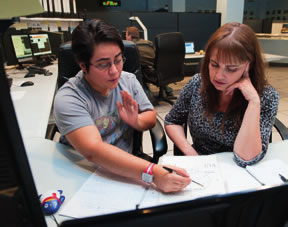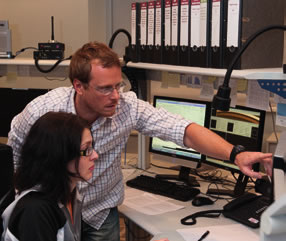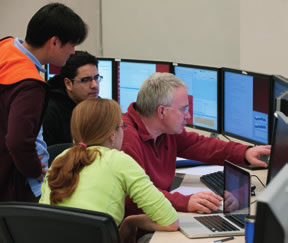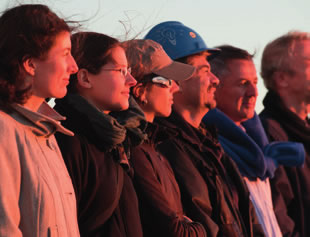Share
Working at ESO
Are you interested in working in areas of frontline technology and in a stimulating international environment? Do you feel your profile matches our requirements? Learn more about our current vacancies and apply online. Read more..








The European Organisation for Astronomical Research in the Southern Hemisphere (ESO) is the foremost intergovernmental astronomy organisation in Europe and the world's most productive ground-based astronomical observatory. ESO carries out an ambitious programme focused on the design, construction and operation of powerful ground-based observing facilities enabling astronomers to make important scientific discoveries.
ESO operates three unique world-class observing sites in northern Chile: La Silla, Paranal and Chajnantor (home to ALMA), and the ESO Headquarters are located in Garching, near Munich, Germany.
At Paranal, ESO operates the Very Large Telescope, the world's most advanced visible-light astronomical observatory, and will host and operate the southern array of the Cherenkov Telescope Array, the world's largest and most sensitive high energy gamma-ray observatory. ESO is a major partner in ALMA, a millimetre/submillimetre interferometer and currently the world's largest ground-based astronomical project. On Cerro Armazones, ESO is building the 39-metre Extremely Large Telescope (ELT), which will become "the world's biggest eye on the sky" and whose operations will be fully integrated into the Paranal Observatory.
For its Back-end Operations Department, within the Data Management and Operations Division in the Directorate of Operations at its Headquarters in Garching, near Munich, Germany, ESO is advertising the position of
Astronomical Data Scientist
Garching
Deadline 23/03/2024
The Back-end Operations Department (BOD) is responsible for the management of science data from ESO's optical/near-infrared La Silla Paranal Observatory. This includes the scientific and operational development of the ESO Science Archive, the generation of science data products for distribution through it, the collection, verification and archiving of archival data products from the community, and the scientific oversight to the reduction of ESO data. In particular, the ESO Science Archive has grown to be a powerful resource for the worldwide astronomical community, contributing to about 40% of ESO's science output. This growth was fuelled by an increasingly complex and extended data content, whose expansion needs to continue into the next era, marked by the advent of the ELT.
The successful candidate will take a leading role in increasing the quality and scope of the content of the ESO Science Archive.
Main Duties and Responsibilities:
Enhance the content of the Science Archive by:
- Supporting teams in the community and internal to ESO in the submission of data to the ESO Science Archive.
- Mining the ESO Science Archive to build higher-level products from the existing content.
- Mining other relevant archives for content of interest to the ESO Science Archive.
- Contributing to the planning of the data management activities.
- Advance the data standard that ESO has defined as interface to the archive by working on its maintenance and evolution.
- Contribute to the definition of user services of the ESO Science Archive.
- Contribute to ensuring the integrity of the holdings of the ESO Science Archive (data and metadata).
- Research duties consisting of up to 50% or 20% of your time depending upon your profile. (See the following note.)
Note. Two options exist to fill this post. A research active astronomer who will work on an independent personal astronomy research programme with up to 50% of the time available. You will be a ESO Astronomy Faculty member.
Alternatively, we may fill this post focussing this role on 80% operational work with the remaining 20% driven by research. In this case you will not be part of the ESO Astronomy Faculty. The construct will depend upon the profile of the successful candidate.
Reports to:
The Head of the Science Archive Group.
Key Competences and Experience:
Essential Competences and Experience:
- Proficiency with working with large astronomical datasets.
- In-depth experience with curation of astronomical data and metadata.
- Working knowledge of astronomical data standards.
- Familiarity with astronomical data centres and science archives.
- Understanding of the needs of astronomers in the community on issues regarding data quality, archive science and similar.
- Strong cooperative skills to interface with other departments/teams.
- Critical thinking/problem solving skills
- For the Astronomy Faculty member profile, an established track record of astronomical research and publication.
Desirable Competences and Experience:
- Experience with data mining and deep learning frameworks.
- Working knowledge of Python, especially of its astronomy-oriented packages.
- Working knowledge of SQL.
- Familiarity with basic project management concepts and practices.
- Familiarity with Virtual Observatory protocols and tools, and the FAIR Data Principles.
- Experience with ESO data.
- Experience in defining user requirements for software projects.
Qualifications:
PhD in Astronomy/Astrophysics, Physics or equivalent.
Language skills:
The position requires an excellent command of written and spoken English.
Remuneration and Contract:
We offer an attractive remuneration package including a competitive salary, comprehensive pension scheme and medical, educational and other social benefits, as well as financial help in relocating your family and support to place your child/children in daycare.
ESO's salary structure is based upon a range of career paths which reflect the nature and level of our jobs. Each career path is made up of two or three grades which are used to further reflect experience.
Please follow this attached link for more details https://www.eso.org/public/jobs/conditions/intstaff/salary-structure/
ESO aims to support members of personnel in maintaining a good work-life balance (https://www.eso.org/public/jobs/conditions/intstaff/#work-life-balance) between their professional and private life. ESO is also committed to offering family-friendly support (https://www.eso.org/public/jobs/conditions/intstaff/#family-friendly-support), creating a work environment and policies which allow staff to balance their professional and private responsibilities through flexible working arrangements and financial support for families.
The contract is for a fixed term duration of three years and is subject to successful completion of the probation period. There may be a possibility of extension(s) subject to individual performance and organisational requirements, and as defined in the applicable policies and staff rules and regulations. For any further information, please visit ESO's conditions of employment (https://www.eso.org/public/jobs/conditions/). Please note that the contract policy and in particular the regulations concerning fixed-term and indefinite contracts are currently under review which may lead to changes in the contractual conditions applicable to this position.
Duty Station:
Garching near Munich, Germany with occasional duty trips to all ESO sites in Chile.
Career Path:
V, which covers three grades.
Application:
If you are interested in working in areas of frontline science and technology and in a stimulating international environment, please visit http://www.eso.org for further details.
Applicants are invited to apply online at http://jobs.eso.org. Applications must be completed in English and should include a motivation letter and CV and as appropriate (for astronomers) a publication list and a full research statement. Also required are the names and contact details of three persons familiar with your work and willing to provide a reference letter. Referees will be automatically invited to submit their letter; however, applicants are strongly advised to trigger these invitations (using the web application form) well in advance of the application deadline.
Deadline for applications is 23 March 2024.
Interviews are expected to start soon after this date.
ESO Values
An important element in any successful employment relationship is harmony in values between an organisation and its people.
The ESO Values are:
ESO strives for excellence through innovation.
ESO provides outstanding services to its communities.
ESO fosters diversity & inclusion.
ESO believes in the key role of sustainability for its future.
Achieving the above are recognized as only possible on the basis of personal values and attitudes that we expect from our employees: respect, integrity, accountability, commitment, collaboration, and clear & open communication.
Applicants to any ESO role are asked to reflect on their affinity with these values and advised they may be asked about them if called for interview.
Diversity
ESO has established diversity as an important value of the Organisation, is committed to providing an equal opportunities environment and is actively seeking to promote a diverse, equitable and inclusive workforce. Please visit https://www.eso.org/public/about-eso/sustainability/dei-at-eso/ for further details.
Nationality
No nationality is in principle excluded from employment at ESO, however, recruitment preference will be given to nationals of our Member States, host states and strategic partners: Australia, Austria, Belgium, the Czech Republic, Denmark, Finland, France, Germany, Ireland, Italy, the Netherlands, Poland, Portugal, Spain, Sweden, Switzerland, the United Kingdom and Chile, irrespective of gender, age, disability, sexual orientation, ethnicity or religion.
